|
EXCURSIONS AND PLACES TO VISIT |
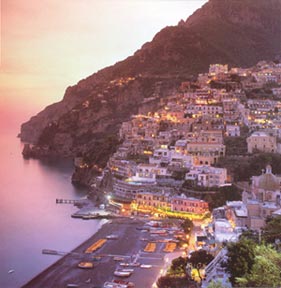 |
POSITANO
Positano seems to be standing, leaning
against the jagged mountain rock face,
with many multicoloured houses that seem
to be built in a single cluster, all on
top of each other. The town is very
unique and incredibly attractive,
capable of attracting attention to many
visitors. It is the kingdom of many
flights of little steps, of narrow
passageways enlivened and coloured by
wonderful shops, lively bars and cafes,
and restaurants that specialise in
seafood. |
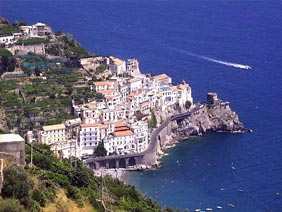 |
AMALFI DRIVE
The "Amalfi Drive" is said to be one of
the most spectacular roads in Europe and
from Sorrento the winding cliff top road
offers breathtaking panoramic views from
every bend. Amalfi, now a thriving
holiday resort, was once a powerful and
prosperous marine republic, and homeland
of Flavio Gioia, the inventor of the
compass. The beautiful cathedral, with
its ornate façade, stands at the top of
steps leading up from the main square,
and houses the remains of the patron
saint of Amalfi, Saint Andrew. |
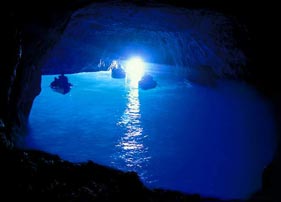 |
CAPRI
No visit to Capri
is complete without at least a
few hours spent on the
Mediterranean sea surrounding
the island.
Whether you choose to join an
organised tour, or rent a
private boat with captain,
taking to the turquoise waters
is the only way to explore some
of the most beautiful parts of
the island. In fact, many of the
most enchanting stretches of the
Capri coastline are completely
inaccessible by land. By boat
visitors are able to reach those
secluded bays which are just
perfect for swimming or sun
bathing - far from the crowds
crammed onto the tiny pebble
beaches.
A leisurely tour around the
island will last roughly two and
a half hours, including time for
a quick dip in the sea. For
those with more time at their
disposal, full day excursions
can easily be arranged. |
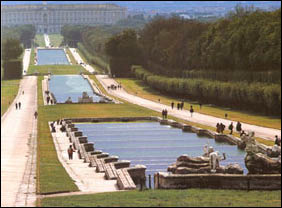 |
LA REGGIA DI CASERTA
Caserta is known as the "Versailles of
Naples" after the Royal Palace built
here by the Bourbon King, Charles III,
in the 18th century. The enchanting
palace overlooking the huge square is
one of the most sumptuous buildings of
its kind in Italy. It has over 1,200
rooms and is full of paintings and rich
decorations. The magnificent gardens are
3 km long and their crowning glory is a
75 metre high waterfall, which can be
clearly seen from the palace. |
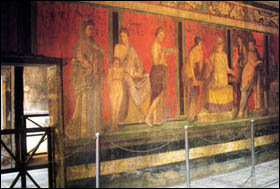 |
GLI SCAVI DI POMPEI
Pompei holds an intense fascination for
visitors today. Following the eruption
of the volcano Mount Vesuvius in the
year 79 AD, Pompei lay buried and
forgotten for hundreds of years and the
excavations begun in the 18th Century
are still being carried out today. You
can see the past prosperity of the town
in the Roman villas, bathhouses and
temples which have been unearthed. Even
an amphitheatre has been found. |
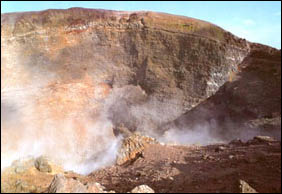 |
VESUVIO
Mt Vesuvius is the only active volcano
in Continental Europe, the most
populated and it is also the most
extensively studued volcano on the Earth.
The current shape of the volcano is the
result of the continual alternation
between "explosive" type eruption, which
have produced pyroclastic deposits. |
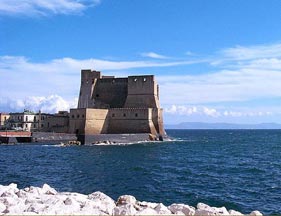 |
NAPOLI
The city of Naples was probably
founded by the Greeks around the
eighth century BC, just
kilometres from the older town
of Partenope; this ‘new town’ or
‘Neapolis’ has been absorbing
the influences of its settlers
and invaders ever since. Romulus
Augustulus, last emperor of the
Roman Empire, was imprisoned
here after being overthrown in
476. In the sixth century,
Naples was conquered by the
Byzantines, and it was one of
the last duchies to fall to the
all-conquering Normans in 1039,
as they founded the Kingdom of
Sicily. In 1266 Naples and the
kingdom of Sicily were given by
Pope Clement IV to Charles of
Anjou, who moved the capital
from Palermo to Naples. In 1284
the kingdom was split in two,
and stayed that way till 1816,
when they would form the kingdom
of Two Sicilies. |
|
|